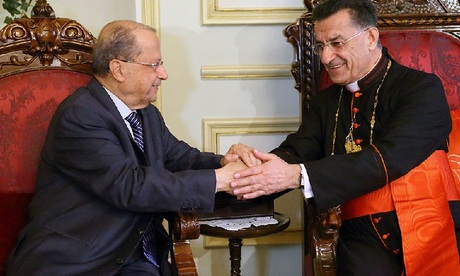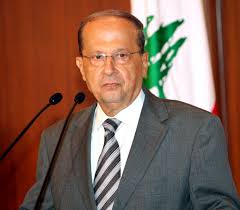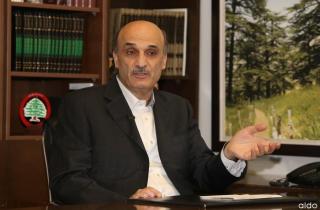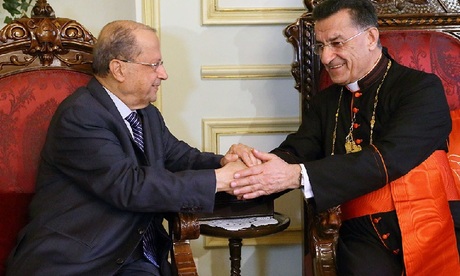
Michel Aoun: The Last Strong Candidate

Ghassan Saoud - al-Akhbar*
If Michel Aoun was not a candidate to the presidential polls, the LBCI could have broadcast a show similar to that of beauty pageants or Star Academy, a reality TV show to elect a new president. This will happen in the future, unless a president who restores balance to the political sectarian system and who plays the role of the arbitrator instead of the fool is elected.
 There won't be similar presidential elections ever again in Lebanon. Since 1990, there has been hope of the return of a strong president to Baabda palace, so that parity should be activated and balance between power partition among Christians, Sunnites, and Shias is restored. A strong president means not a person with a criminal record, or an expert in fueling sectarian tension, or someone who has throughout his six-year-term supervised the process of emptying the state institutions from their funds; but rather a person whose political career was built inside the walls of the army command at the time, and someone who has gained the support of 70% of the Christians, and someone who has a bloc of 27 lawmakers at the House, and someone who had once ten ministers at the Cabinet, and someone who participates in the leadership of his political alliance instead of being lead into it.
There won't be similar presidential elections ever again in Lebanon. Since 1990, there has been hope of the return of a strong president to Baabda palace, so that parity should be activated and balance between power partition among Christians, Sunnites, and Shias is restored. A strong president means not a person with a criminal record, or an expert in fueling sectarian tension, or someone who has throughout his six-year-term supervised the process of emptying the state institutions from their funds; but rather a person whose political career was built inside the walls of the army command at the time, and someone who has gained the support of 70% of the Christians, and someone who has a bloc of 27 lawmakers at the House, and someone who had once ten ministers at the Cabinet, and someone who participates in the leadership of his political alliance instead of being lead into it.
Voilà Michel Aoun!
His candidacy was not envisaged during past elections. Nonetheless, too many think of him at each poll. In 2008, Aoun's close circle believed in the seriousness of his candidacy, except for himself. But today, the General's chances are a step away from Baabda.
There are funded candidates, and well educated ones; others are caricature-like, while some are conventional and some are motivated.
All of them are just typical. Tens like them will come and go; no one will feel the difference. But for the first time, and most likely for the last, General Aoun will run for presidency. One may ask why to wager on Aoun to build the republic after bets on him to build a small party have failed; or how he will be entrusted with consensual democracy in the country while he doesn't even believe in democracy at his own political house. Tens of questions may be asked. But, most importantly, it is for the last time that Christians will have a strong candidate to the presidency of the republic.
Not only does Aoun stem his strength from his past, but also from his ability to restore balance to powers in the future. What is being said about Aoun reassuring Hizbullah I order to venture into serious dialogue on the defense strategy is blab, and so is what's being said about Aoun guaranteeing the interests of US oil companies. The most important thing in Aoun's presidential program is restoring balance to power.
A permanent Rabieh visit explains that the regional balance today precludes Sunnites from keeping a power share bigger than that of Shias, due to the Future Movement's controlling the power share of Sunnites and a large share of Christians'. It is the same balance that precludes the conclusion of a new Taef Agreement that redistributes power clearly between Sunnites and Shias. This is where Aoun's importance lies. He is able to ask Future for giving Christians what is basically theirs, without having to explain these allocations as a defeat for the Sunnites and a victory for Shias.
This is how the regional balance is mirrored locally, with no side being neither the victor nor the vanquished; hence, the crisis of fragile stability in Lebanon is contained, as the international community hopes.
It is not Aoun's last chance alone. It is also Taef's last chance. Nothing alludes to anybody having a political experience similar to that of Aoun and a popular representation equal to that he does, in addition to this amazing network of connections and his allies, deputies, and ministers' confidence and trust in him. Whether to implement Taef Agreement as a formula of parity that preserves balance in power among the different sects or every hope to have balance in power fades and opens the doors to calling for a new political contract that ends the era of formal parity and redistributes power according to the political and sectarian forces' size, which jeopardizes stability.
"It's either Michel Aoun or chaos," a US diplomat said to a Lebanese friend, just days ago, joking aside!
But how is Aoun behaving? Since months, he's been distracting the Free Patriotic Movement with its bylaws off the presidential polls. He does not want marches chanting his name or a radio campaign, like the one on Free Lebanon station: "Samir Geagea (two-second silence) a president of the republic." He doesn't want a lobby that places the capacities of his friends from Habib Efram to Elie Ferzli at the disposition of his electoral battle or even lawmakers who convey to him what they hear or read here and there. He is rather keen on having the frontline lined up by his own self, with the second row comprising Gebran Bassil alone and nobody behind them.
All the others would lose if Aoun lost without having had the honor of fight. Friends may speak positively of him. Media may do what seems adequate. Aounists may pray and even light a candle for him. He wouldn't ask for any of all this. He wouldn't want his supporters to beg for votes on their social media accounts via this or that survey. He wouldn't want the Christian Gathering to convene in support for him. He wouldn't want happy cheering crowds singing for him in regional festivals or others. He is not concerned with his image making.
This time, more than any time before, he stick to his "one man machine" label. Aoun wouldn't believe that MP Michel Murr had made of Elias Sarkis, Bashir Gemayel, Amine Gemayel, Emile Lahoud, and Michel Sleiman presidents; today he won't believe that Nabih Berri, Walid Jumblatt, and Marcel Ghanem do make presidents.
According to his itinerants, Aoun deals with "clarity of mind" with the presidential polls' due date, clearly telling reality from dreams. From months ago, he has decided to avoid wasting time in insignificant battles and rivalries that only distract him and impede his progress.
Aoun says that the president is not made in Lebanon; it is rather a result of an entente, or the opposite, between the US and Iran, with what comes previously as the outcome of US-Saudi and Iranian-Syrian talks. He doesn't doubt at all that Hariri wouldn't lead, whatever the level of their personal relation is, his presidential battle. All the individual efforts aims to guarantee Hariri's welcoming the election of Aoun as president if he is agreed upon internationally, instead of Future leader's deprecation.
Aoun's relation with Hariri's advisor, former lawmaker Ghattas Khoury, has become very tight. He even speaks with admiration of Nader Hariri. He was also glad to learn that the latter and Minister Nohad Mashnouq had invited themselves over dinner at Minister Gebran Bassil's place. Relations are only improving, but Aoun will not be Hariri's candidate. The password has not been pronounced yet and the Saudi embassy has not asked for an appointment yet to present Aoun with an invitation from the King to visit Saudi Arabia. Even President Bashir Gemayel, one Aounist says, needed a royal visa on his passport before entering the presidents' club.
The man knows well that his appearance as the one capable of restoring balance to power is strength to him; yet it is also one of his weak points in the eye of those who believe that restoring balance to power means to seize some of their appropriations." Besides, he knows well that he will not get any final answer from the Americans, neither today nor tomorrow, and this is why he clings to leading his battle alone.
As to exaggerating about the US positivity, it shall drive the embassy in Beirut to issue a statement hereby denying the positive ambiance and announcing opposing steps. He does not meet with US ambassador David Hale as much as media means show he does. The envoy's relation with Bassil is very good, with the test messages exchanged between the two men reminding much of those exchanged between ambassador Jeffrey Feltman and March 14 forces. Aoun also knows that the civilization of the US interests make them prevail their minds over their hearts, which facilitates his mission: the priority of local stability to them has pushed the, to call for the formation of a government, even with the participation of Hizbullah; and the priority of combatting terrorism, to the,, has driven them to fight alongside Hizbullah.
How would it be like if he was elected a president who would guarantee those two priorities and even more? The hardest mission is KSA, whereby emotions and primary stances precedent interests and everything else.
Regarding House Speaker Nabih Berri, Aoun fears the negative effects of the constant blabbering about both men's personal relation-which is considered to be a looming direct step towards the Speaker. He won't get enough this time of relying on Hizbullah to pressure Berri like he used to do previously, especially that the past experiences were not conducive; and he knows well that Berri's approval may open too many closed door to him whether with Walid Jumblatt or others. As to Jumblatt, Aoun does not want to be asked about the churches of Chouf and he doesn't want his deputies to mobilize the public opinion against the nomination by Mukhtara leader of Henri Helou to run for president.
Instead, Aoun seeks what reassures Jumblatt that his reaching presidency does not contradict with the latter's role as the kingmaker of Lebanon's political life. In fact, Aoun is carefully sensing Jumblatt's pulse in the event of promises of giving the Druze leader the Ministry of Interior as long as he shall be president, so that he guarantees for his son a great start at the first ministry of his career.
He who knows Aoun, know well that he does not know how to resort to leverages or takes initiatives towards others, except for Minister Bassil. Here he is now obliged to do all this, and even more. He made his name in Lebanon's history when he refused the US-Syrian making of the Lebanese president, calling the people to say their word.
Here he is now admitting that there cannot be made-in-Lebanon president, waiting for the Americans to whisper that password. He is absolutely not a consensual personality. But he refuses to talk about what's after May 24, and acts as if his political future has become dependent on the consent of all states, and Nabih Berri, Saad Hariri, Walid Jumblatt, and [even] Michel Mouawad over his election as president. But he is elected president, his loss according to what he had to do to enter the game he had repeatedly tried to break, is nothing compared to the loss if those who had endeavored to break him, because now they have to recognize his popular and political legitimacy as the president of the republic.
President depending on Iranian-Saudi entente
The head of the Change and Reform bloc is not the only one reckoning on an Iranian-Saudi rapprochement to win the presidential polls. Army Chief General Jean Qahwaji and former Minister Jean Obeid also do. Informed sources say that the chances of the three men depend on the aforementioned entente. In case the agreement is comprehensive, including restoring balance to power in Lebanon as per a new no-loser-no-winner formula, starting serious dialogue on the defense strategy, having the state seriously venture into a sider operation to stamp out terrorism, and clinching stability so that the Lebanese extract oil, Aoun is the first candidate.
But if the Saudi Arabia and Iran only agreed on a number of dossiers, on top of which the war on terrorism, Qahwaji is then the candidate, noting that he succeeded in gleaning the top intelligence services at his office from all over the world, to fight terrorism. This is what debars any influential veto, whether from Hizbullah or the Americans.
As to Aoun's veto to Qahwaji, it is still on the go thus far and its impact on Hizbullah is still unknown. Moreover, in case there is agreement on assuaging the dispute without solving it, Jean Obeid is the first candidate. There will be a grace period for the Lebanese. Perhaps former minister Ziad Baroud is the only one with a profile similar to Obeid in that respect, relying on the support of the Maronite Patriarchate locally and the authority of the French diplomacy in KSA; noting that if Obeid wins, there will be no winning camp in Lebanon. But if "Baroud" is the password, the term of Sleiman will be renewed.
Geagea on a crossroad
Following the 2009 legislative polls, Lebanese Forces leader Samir Geagea tried to form a powerful parliamentary bloc. Saad Hariri had promised him before the elections to "lend" him some MPs, which turned out all to be from Zahle eventually. The lawmakers of Ashrafieh and other regions did not meet Hariri's call. Subsequently, Geagea swore not to try to look again like the head of a powerful parliamentary bloc.

He then tried to look like the first Christian leader, through calling on tens of current and former Christian lawmakers and heads of parties. However, a meeting for Deputies at Future MP Michel Pharaon's residence and another at Minister Boutros Harb's house , in addition to the sudden pulse of the Kataeb party and the awakening of March 14 General Secretariat precluded the LF head from appearing like the first Christian leader. Soon after, Hariri clarified, following the formation of the government that Geagea's representation at the Cabinet did not mean much to him. Therefore, one may logically ask: what is Geagea doing alongside Future Movement as long as they do not want him as a Christian leader or as a head of powerful parliamentary bloc or a candidate to the presidency of the republic? Geagea does not seek to have Future Movement adopt his candidacy as much as he looks for being granted the veto right on General Michel Aoun's reaching power.
This is what drives a former March 14 Deputy to conclude that Geagea is standing on a decisive crossroad, especially that he does not perceive the danger of a financial ban on him.
On a different note, the presidential polls; due date will certainly have direct effect on the relation between the Free Patriotic Movement and March 8. It is worth-mentioning that agreeing on a president must be preceded by an agreement over an electoral law. Hizbullah and Amal Movement;s ability to make concessions here are bigger than that of Future Movement; for their parts, Walid Jumblatt and Kataeb party will find more rewards here than with Future Movement. And, for Future Movement, Aoun is less demanding than the Lebanese Forces.
Bkerki: contradictions and ambiguities
What would you do if your brother was kidnapped? What would you do if the kidnapped was your colleague? What if he was a bishop, whose father is not Ibrahim Saqr and whose reference is not the Lebanese Forces? One of the two bishops abducted in Syria is the brother of Orthodox Patriarch Yuhanna Yazegi. He is the colleague of Beirut Greek Orthodox Archbishop Elias Audi who could not find time last week to partake in the meeting held in solidarity with the kidnapped clerics, organized by the Syriac League and the Orthodox Gathering at Sacrés Coeurs school in Ashrafieh.

Audi was busy looking for a new buyer of another piece of land affiliated with properties of the Orthodox Church, other than that he had sold for Safa Sports Club. Beirut Maronite Archbishop Boulos Matar was also busy that day. As to the Maronite Patriarch Mar Beshara Boutros Rahi, his visits abroad are more important than participating in a meeting held in solidarity here or a "pilgrimage" to the pockets of Takfiris escorted by all the media means he loves to drag with him. Yuhanna X listened to the advice of former minister Tarek Mitri who recommended him to contact the Prince of Qatar one day after his brother was kidnapped. And that was it! No satellite ever saw anybody.
No Turkish, Gulf, western. European, Syrian intelligence services ever heard anything. Two bishops went missing. Head of the Syriac League, Habib Efram, did not find a solution but to call the Holy Syriac Congregation to elect Yuhanna Ibrahim as the new Patriarch. Perhaps somebody would care. But, nobody cares.
At the school, the political audience was huge. There were representatives of the President of the Republic, the House Speaker, and the Prime Minister, in addition to current and former ministers and lawmakers. The biggest crowd comprised Christian political, media, and intellectual figures who find themselves, at each due date, since thirty years, alone.
The emotions and speeches during last week's solidarity meeting was nothing but an explicit expression of hidden concerns over the presidential polls. In fact, the church is in a place and its leadership is somewhere else. When two bishops are snatched and not a single church seriously cries out, it is very normal then to snatch the presidential chair-after the powers-while Bkerki is busy traveling and giving statements.
He who did not close the doors of Bkerki after he said he wanted the Orthodox law and full stop will not close them after he said he wanted a president from the four Maronite leaders, and full stop.
Comments



